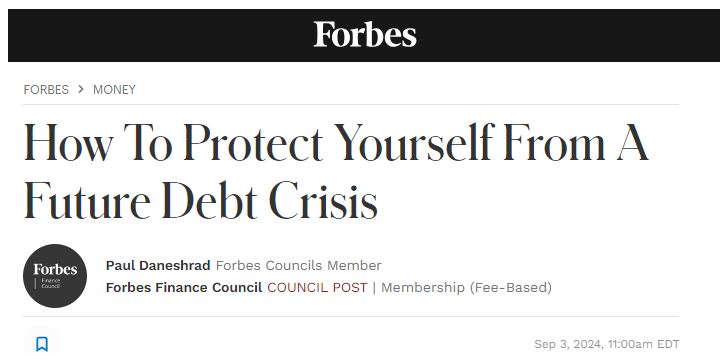

Examine the data, and it’s clear that the United States and a lot of global economies are on an unsustainable path that will lead to trouble.
Our debt continues to climb, with a January 2024 article in Axios noting that the “U.S. debt-to-GDP ratio surpassed 100% in 2013 and currently stands at 123%, according to the International Monetary Fund (IMF).” On the global level, CNBC reported in February 2024 that both “high-income countries as well as emerging markets have seen a substantial rise in their debt piles, which has grown by a $100 trillion from a decade ago, fueled in part by a high interest rate environment.” In fact, economist Arthur Laffer Jr. told CNBC then that he expects “‘that the next 10 years will be the Decade of Debt’” and that worldwide, debt “‘is coming to a head.’”
According to the U.S. Department of the Treasury, since 1960, “Congress has acted 78 separate times to permanently raise, temporarily extend, or revise the definition of the debt limit.” The debt ceiling was supposed to be a mechanism to decrease our spending and limit our debt. But the U.S. government has kept raising it (78 times!)—and I predict that they’ll do so again. And every time we raise the debt ceiling, we’re further from solving a potential financial crisis. Moreover, from my observations, there aren’t any easy solutions to the financial problems our nation and the world are facing. The possible solutions that governments could explore, such as raising taxes and reducing government services, have obvious drawbacks and are not popular.
I believe we’re on a trajectory to a debt crisis. The national and global economies are increasingly in trouble. In the backdrop of a looming debt crisis, you can’t count on anyone but yourself to save you. It’s critical that you start preparing now.
Many People Aren’t Prepared To Weather A Debt Crisis
Unfortunately, many people aren’t prepared to weather a debt crisis. Consider reporting from Business Insider, which explained that per data from the Federal Reserve’s 2022 Survey of Consumer Finances, “the average American family has $62,410 in savings, across savings accounts, checking accounts, money market accounts, call deposit accounts, and prepaid cards.”
Other statistics paint an even more sobering picture of the financial reality many people are grappling with. According to a 2024 Forbes Advisor survey, 28% of Americans have less than $1,000 in savings, with this being “the case for 32% of Gen Zers, followed by Millennials at 31%, Gen X at 27% and Baby Boomers at 20%.” Even if people manage to set aside a portion of their paychecks, chances are, it’ll likely have to go toward a debt repayment—Americans owe $1.14 trillion in credit card debt alone, as highlighted in a 2024 CNBC article that cited data from the Federal Reserve Bank of New York.
Financial Independence Will Be Increasingly Crucial
The lack of savings and high debt plaguing people is cause for alarm. I believe that many people will find themselves at the mercy of others for basic sustenance during a future debt crisis if they don’t take steps to become financially self-sufficient.
While some people believe they’ll be able to turn to their family and friends for help during a debt crisis, I caution against latching onto this hope. During a debt crisis, each person will have their own struggles. Your relatives and friends will likely be so focused on making ends meet themselves—especially if they lose their jobs—that they might not have enough savings to help you.
Focus On Saving And Investing
To prepare for a future debt crisis, start saving and investing now as much as you can. It can be challenging to do so, given the salaries and higher costs we’re seeing these days. However, I believe that every person can start to save or save more of their disposable income than they are currently saving by curbing their consumerism.
We’re inundated with countless advertisements as we go through our lives. Credit cards and buy now, pay later (BNPL) plans have arguably made it easier than ever to spend money on things we want but don’t need. If you spend less on things you don’t truly need and put that money back into your savings and investments, you’ll be better off in the long term. These changes don’t have to be drastic. For instance, if you attend a concert every few months, you can opt for cheaper seats. Instead of buying designer items, you can look for less expensive items that are similar in function. Every time you’re about to make a purchase, ask yourself, “Do I really need this?”
Additionally, to boost your savings and investments, try to start another income stream if possible. You might have obligations that make working another job or picking up a side hustle difficult or impossible; that’s understandable. But if you have the time to do so, look into another way to make money. Don’t rely on just one job or even one field. If the economy crashes, having another passive and durable income stream is critical and can keep you afloat.
Ultimately, by taking steps to increase your savings and investments today, you can safeguard yourself from the dire consequences of the coming debt crisis.
Forbes Finance Council is an invitation-only organization for executives in successful accounting, financial planning and wealth management firms. Do I qualify?
Find the Forbes article HERE.


